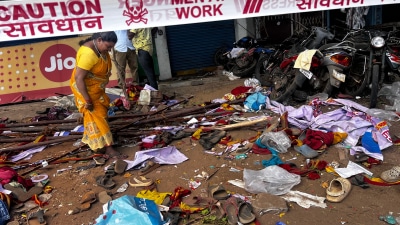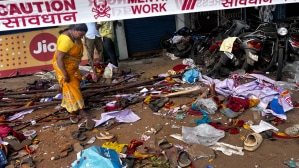Loan recasts by FIs in full swing
MUMBAI, MAY 14: Many leading business groups are now knocking at the doors of financial institutions to reschedule their loans in a bid to...

MUMBAI, MAY 14: Many leading business groups are now knocking at the doors of financial institutions to reschedule their loans in a bid to keep out of the defaulters list. While some were accepted by the FIs, others are waiting in the wings with their proposals.
It is not surprising that the same old names crop up in the business of evergreening the accounts. The usual demands: fresh loans, waiver of interest on past loans and new repayment plans. Sanghi Polyester Ltd (SPL) has approached the financial institutions with a loan restructuring package consisting conversion of arrears amounting to Rs 35 crore interest into zero coupon debt, conversion of 35 per cent of loan into non-interest bearing non-convertible debenture and conversion of Rs 37 crore of interest arrears into equity.
Institutions recently bailed out the loss-making Lloyds Steel Industries. FIs have agreed to extend fresh loans of Rs 75 crore to finance the company’s outstanding interest dues besides rescheduling repayment of loans. The fresh loan of Rs 75 crore will carry an interest rate of minimum term lending rate plus 3.5 per cent per annum, repayable in 24 equal quarterly installments from April 1, 2002. This loan will help the company repay interest of Rs 75 crore on existing loans and non-convertible debentures, accrued upto March 31, 2000.
In the case of Essar Oil, institutions recently considered a proposal for additional funding which will enable the company to service the overdue interest payments. Jindal also managed to get additional funding for its project. “In several cases, the companies managed to show higher cost overrun and got away with fresh loans. Their terms and conditions were favourable to the companies seeking loans. The bailout package for the Flex group last year is the best example of managing maximum concessions,” FI sources said.
When JCT’s recast plans was approved, the institutions imposed various conditionalities like infusion of additional funds by the promoters through the sale of assets. But institutions say that these are normal conditions applicable to any such loans. Others like Modern group, which has made huge losses in the last two years, have also sought fresh bailouts.
“It makes sense for both the companies and institutions to consider a loan reschedulement. While the company can keep its name out of the defaulters list, the bank or financial institution can show a lower non-performing asset (NPA) in its books,” said the former chief of a leading institution. “The total NPA of the banking system has already reached Rs 58,000 crore. If things don’t change, the NPA figure will touch Rs one lakh crore mark very soon,” said a bank union source.
Even then the bad debts ate into the profits of IDBI in the last fiscal. IDBI net profit fell by 25 per cent to Rs 947 crore due to higher provisioning for bad debts which increased to Rs 774 crore from Rs 311 crore. ICICI claimed that it settled dues aggregating Rs 515 crore from 112 cases last year. IFCI, the third institution, is yet to come out with its financial results.
There is another category of companies which are beyond any bailout or revival. “Companies like Parasrampuria, Orkay, JK Synthetics and Rajinder Steels are beyond repair. A huge amount of institutional money (not less than Rs 1,000 crore) is locked in these companies. It is to be seen how FIs will recover their funds in these companies,” FI sources said.
The move by FIs to bail out steel companies last year had drawn considerable flak. While considering the demands of steel companies favourably, FIs had ignored the claims of textile and chemical companies. Once bitten twice shy, FIs are not clubbing bailouts or reschedulements together. The moot question is: will banks and institutions offer the same terms and conditions to all their borrowers?
Photos







- 01
- 02
- 03
- 04
- 05
























